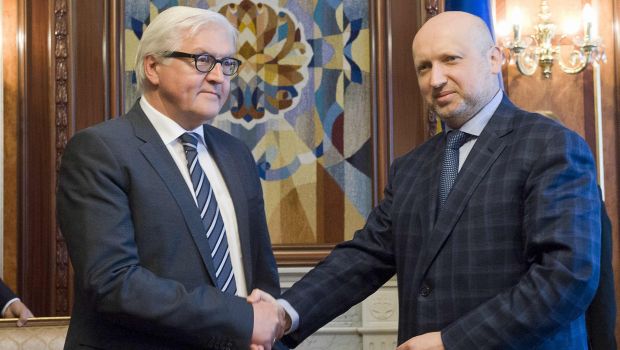
Ukraine’s acting President Oleksander Turchinov (R) shakes hands with Germany’s Foreign Minister Frank-Walter Steinmeier (L) during a meeting in Kiev May 13, 2014. (REUTERS/Anastasia Sirotkina/Pool)
Speaking at Kiev’s main airport, envoy Frank-Walter Steinmeier said Germany supports Ukraine’s efforts to arrange for a dialogue between the central government and its opponents in the eastern Donetsk and Luhansk regions, which form the nation’s industrial heartland.
Pro-Russia insurgents have seized government buildings and clashed with government forces in eastern Ukraine in the past month and are holding some journalists and others hostage.
Steinmeier voiced hope for a quick release of the hostages, the handover of occupied buildings and stressed the importance of holding Ukraine’s presidential vote as planned on May 25.
The Ukrainian government and the West have accused Russia of fomenting the mutiny in the east to derail Ukraine’s presidential vote and possibly grab more land.
Steinmeier’s trip is part of the road map for settling Ukraine’s crisis laid out by the Organization for Security and Cooperation in Europe, a trans-Atlantic security group.
Russia called Tuesday for a swift implementation of the OSCE plan, saying its demand to end violence means that the central government in Kiev should stop its military operation to recapture buildings in the east, lift its blockade of cities and towns, pull its forces from eastern regions and release all political prisoners.
“We are demanding (they) stop intimidating civilians by using force or threatening to use it,” Russia’s Foreign Ministry said in a statement.
It added that it expects separatists in Ukraine’s Donetsk and Luhansk regions to respond in kind if Kiev complies.
“[The road map] creates conditions for launching a broad national dialogue involving all political forces and regions of Ukraine, aimed at reconciliation and a comprehensive constitutional reform intended to stop the nation from sliding further to catastrophe,” the ministry said.
Russia also urged the United States and the European Union to persuade authorities in Kiev to prioritize discussions of giving more powers to Ukraine’s regions ahead of the country’s May 25 presidential vote.
The separatists held a referendum Sunday and claimed that about 90 percent of those who voted in Donetsk and Luhansk backed sovereignty. The two regions declared independence on Monday and those in Donetsk even asked to join Russia.
Ukraine’s acting president called the vote a sham and Western governments said it violated international law.
The Kremlin has shown no immediate intention of annexing eastern Ukraine as it did the Crimean Peninsula in March.
Instead, Moscow has pushed for talks between Ukraine’s central government and eastern regions on Ukraine’s future—a cautious stance suggesting that Russia prefers a political rather than a military solution to its worst standoff with the West since the Cold War.
The interim government in Kiev had been hoping the May 25 presidential vote would unify the country behind a new, democratically chosen leadership. But Ukraine’s crisis could grow even worse if regions start rejecting the presidential election.
Dozens of people have been killed since Ukrainian forces began trying to retake some eastern cities.
The insurgents in Luhansk said Monday they wouldn’t hold the presidential vote.
The OSCE plan calls on all sides to refrain from violence and urges amnesty for those involved in the unrest as well as talks on decentralization and the status of the Russian language. The group has also promised to set up rapid response teams to quickly investigate all acts of violence.
The plan envisages a quick launch of high-level round tables across the country bringing together national lawmakers and representatives of the central government and the regions.
Serhiy Taruta, the Kiev-appointed governor of the Donetsk region, on Tuesday urged the Ukrainian parliament to authorize a June 15 vote that could help the regions gain more powers while remaining part of Ukraine.
While he dismissed Sunday’s separatist vote as an “opinion poll,” Taruta said everyone in Ukraine, including those in the rebellious east, “should hear answers to the questions that they are concerned about.”
Taruta said key issues include devolving more powers to local authorities, creating municipal police forces and approving a broader use of languages other than Ukrainian.
Tensions in the east were still evident Tuesday as insurgents said unidentified assailants fired at a car carrying Valery Bolotov, a separatist leader in Luhansk. Bolotov was hospitalized with wounds but they were not life-threatening, the insurgents said. Bolotov was the one who announced independence for his region on Monday.
